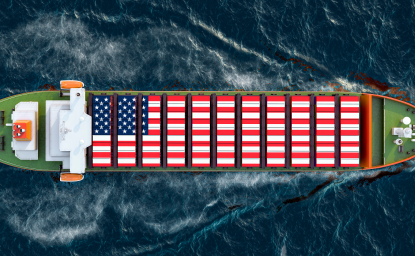The Future of FTAs: Reconciling Free Trade and Sustainable Development
Here are three mechanisms that can help mitigate risks for the local labor markets, for the environment and other public goods in a TTIP agreement.
Here are three mechanisms that can help mitigate risks for the local labor markets, for the environment and other public goods in a TTIP agreement.
Earlier this summer, the German trade minister Sigmar Gabriel declared the negotiation on the Trans-Atlantic Trade and Investment Partnership (TTIP) as failed and not worthy of being continued. French president François Hollande declared he would urge the EU to put an end to negotiations on the agreement and criticized the lack of flexibility of the American counterparts during discussions on public procurement, social standards and environmental protection. On this side of the Atlantic, both presidential candidates have expressed concerns about negotiations on free trade agreements. While Hillary Clinton was a strong supporter of TTIP during her time as Secretary of State, her enthusiasm about the agreement is less flamboyant during her presidential campaign. Donald Trump on the other hand has been a strong opponent of new trade deals in general and even called for a renegotiation of NAFTA.
According to a survey by the Bertelsmann Stiftung, a German think tank, a majority of both German and US citizen welcome free trade, but fear the impact a comprehensive agreement such as the TTIP could have on their daily life.[1] Free trade and the free flow of investments between the two largest economies of the world could indeed have a tremendous impact on lives of Americans and Europeans. There are, however, three mechanisms that can help mitigate risks for the local labor markets, for the environment and other public goods. Recent agreements concluded by Canada, the Netherlands, Belgium and Malaysia in fact already include different types of provisions to ensure sound social and environmental standards.
1. Trade and investment agreements could include a set of “exception clauses” modelled after Art. XX GATT, so as states can keep their regulatory power in times of social or environmental distress. Art. XX GATT enables state to restrict free trade if public goods are at risk. Similar provisions could be included in agreements to restrict the flow of investments in times of need.
2. Trade and investment agreements could include general language clarifications of agreements, which can elaborate on the relationship between already existing – and internationally recognized – commitments on labor rights (such as the core ILO conventions), human rights and the environment. Such measures would prove very valuable for arbitrators who have to interpret the scope of trade and investment agreements during disputes.
3. Finally, the dispute settlement mechanisms included in trade and investment agreements lack transparency and decisions affecting a large number of citizens are being made behind closed doors (and are sometimes not even being published). Especially in the field of international investments, the mere threat by a large investor to make claims in front of an arbitral tribunal has put states under pressure and pushed them to refrain from enacting regulations on social or environmental issues. The EU has proposed to institutionalize arbitral tribunal and to offer some form of judicial review, which would be transparent and open to the public.
It is “en vogue” to promise closed borders, not only for people but also for trade and investments. The prospect of strong national economies and a revitalized Machiavellianism sound appealing on both sides of the Atlantic, but it is an illusion to think globalization will be assenting to such simple recipes. One has also to keep in mind that we are not only in an election year in the USA, but elections are being held next year in Germany and France as well. It is therefore attractive for politicians to make promises, regardless if they are being kept afterwards.
Rather than demonizing free trade and the globalized economy as a whole, negotiations should embrace the fear about megaregional agreements prevailing among American and European citizens. Concerns about a weakening of labor rights protection, about the washing down of environmental standards and the relaxation of food production rules (the holy grail for many Europeans who associate TTIP almost exclusively with US hormone beef, GMO and chlorinated chicken) are to be taken seriously, even if they are not always being rationally expressed. The US and the EU should find ways to include safety measures in their agreements in the form of provisions clearly addressing these issues and reiterating commitments they already made towards labor rights protection, human rights, the environment and other public goods. And most importantly, the negotiations should be inclusive and transparent. The EU has already taken steps in that direction by making some parts of negotiation documents accessible to the public, so the public does not have to rely on WikiLeaks or other non-official sources anymore.
Maybe it will not be possible to find an agreement on common rules for sustainable trade and investment before the election cycles are over in the US and the EU, but negotiating a trade agreement with sound rules for fair globalization and environmental protection is truly a goal worth waiting for. The prospect of such an agreement among the strongest economies in the world could boost both economies considerably and actually lead to higher standards in both the US and the EU. And lastly, such an agreement could have a pioneering effect for the rest of the world, where large trade and investment agreements are on the verge of being negotiated.[2]
[1] Einstellungen zum globalen Handel und TTIP in Deutschland und den USA, 2016: (https://www.bertelsmann-stiftung.de/de/publikationen/publikation/did/einstellungen-zum-globalen-handel-und-ttip-in-deutschland-und-den-usa/).
[2] Next to the two prominent agreements TTIP and TPP, such agreements are being discussed on the African Continent (CFTA), in Asia (RCEP) and among the Pacific island (PACER).


The Global Europe Program is focused on Europe’s capabilities, and how it engages on critical global issues. We investigate European approaches to critical global issues. We examine Europe’s relations with Russia and Eurasia, China and the Indo-Pacific, the Middle East and Africa. Our initiatives include “Ukraine in Europe”—an examination of what it will take to make Ukraine’s European future a reality. But we also examine the role of NATO, the European Union and the OSCE, Europe’s energy security, transatlantic trade disputes, and challenges to democracy. The Global Europe Program’s staff, scholars-in-residence, and Global Fellows participate in seminars, policy study groups, and international conferences to provide analytical recommendations to policy makers and the media. Read more



